- Home
- Mildred A. Wirt
The Girl Detective Megapack: 25 Classic Mystery Novels for Girls Page 2
The Girl Detective Megapack: 25 Classic Mystery Novels for Girls Read online
Page 2
“Is this your kitten?” asked Mary Louise. “We rescued it from a tree down the road.”
The girl nodded.
“Yes. It belongs to my aunt Mattie. Come in, and I’ll call her.”
The girls stepped into the dark square hall and looked about them. The inside of the house was even more forbidding than the outside. The ceilings were high and the wall paper dark. All the shutters were drawn, as if there were poison in the June sunlight. For no reason at all that they could see, the old stairs suddenly creaked.
Jane shuddered visibly, and the girl in the purple dress smiled.
“Don’t mind the queer noises,” she said. “Nothing ever happens in daytime.”
“Then something does happen after dark?” questioned Mary Louise eagerly.
“Oh, yes. Why, only two nights ago—”
“What’s this? What’s this?” demanded the sharp, high voice of an old woman. “What are you standing there talking about, Elsie? With all those peaches waiting to be pared!”
All eyes turned naturally towards the old staircase, from which the sound of the voice was coming. Miss Grant slowly descended, holding her hand on her right side and grunting to herself as if the act of walking were painful to her. She was a woman of at least sixty-five, thin and wrinkled, but with little sharp black beady eyes that seemed to peer into everything suspiciously, as if she believed the whole world evil. She was wearing an old-fashioned black dress, and a dark shawl about her shoulders.
“These girls have found your kitten, Aunt Mattie,” Elsie informed her. “They rescued her from a tree.”
The black eyes softened, and the old woman came towards the girls.
“My precious little Puffy!” she exclaimed, as one might talk to a baby. Then her tone abruptly became harsh again as she turned to her niece.
“Go back to your work, Elsie!” she ordered gruffly. “I’ll attend to this!”
Without any reply the girl slunk away to the kitchen, and Miss Grant took the kitten from Jane.
“Tell me what happened to my poor little pet,” she said.
Briefly Jane repeated the story, with an emphasis upon Mary Louise’s prowess in climbing trees.
Apparently the old lady was touched.
“I must say that was good of you,” she remarked. “Not a bit like what most young people nowadays would do! All they seem to enjoy is torturing poor helpless creatures!”
She put the kitten down on the floor and turned towards the stairs.
“You wait!” she commanded the girls, “I’m going to get you a reward for this!”
“Oh, no, Miss Grant!” they both protested instantly, and Mary Louise went on to explain that they were Girl Scouts and never accepted money for good turns. (Even Silky knows better than that, she added to herself. He won’t expect a bone for rescuing Pussy—only a pat on the head!)
“You really mean that?” demanded Miss Grant, in obvious relief. She would save two cents! She had meant to give each girl a whole penny!
“Tell me your names, then,” she continued, “and where you live. I might want to call on you for help sometime. I can’t trust my niece as far as my nose, and my servants are both old.” Mary Louise chuckled. So there was a mystery in this house! A lurking danger that Miss Grant and her niece both feared! And she and Jane were being drawn into it.
“Jane Patterson and Mary Louise Gay,” she replied. “We live over in Riverside, next to the high school. You can get us on the phone.”
“I haven’t a telephone. Too expensive. Besides, if I had one, I couldn’t tell what deviltry Elsie might be up to.… No, I don’t hold with these modern inventions.”
“Well, you could send Elsie for us if you need any help,” suggested Jane. “It’s only a little over a mile. You see, Mary Louise’s father is a detective on the police force, and we’re both interested in mysteries.”
“I’m not thinking of any mystery,” snapped Miss Grant. “What I’m thinking of is facts. One fact is that I’ve got a pack of scheming relations who are trying to send me off to the hospital for an operation while they loot my house.”
Mary Louise’s forehead wrinkled in surprise.
“I didn’t know you had any relations besides your niece,” she said.
“Certainly I have. Haven’t you ever heard of the Grants in Riverside? Mrs. Grace Grant—a woman about my age? She has two grown sons and a married daughter. Well, they spent all their money, and now they want mine. But they’re not going to get it!”
Her hand went to her side again, as if she were in pain, and Mary Louise decided it was time for them to go.
“Well, good-bye, Miss Grant,” she said. “And don’t forget to call on us if you want help.”
It was a relief to be out in the bright sunlight again, away from the gloom and the decay of that ugly house. Mary Louise took a deep breath and whistled for Silky. He was waiting at the foot of the porch steps.
As they walked down the path they were startled by a rustle in one of the cedar trees. Silky perked up his ears and went to investigate the disturbance. In another moment a head peered cautiously through the branches. It was Elsie Grant.
“Will you come over here and talk to me a little while?” she whispered, as if she were afraid of being caught. “I never see any girls my own age—and—you look so nice!”
Both Mary Louise and Jane were touched by the loneliness of this poor unhappy orphan. They went gladly to her side.
“Don’t you go to school?” asked Mary Louise. “I mean—when it isn’t vacation time?”
The girl shook her head.
“That must be awful!” exclaimed Jane. “Sometimes I hate school, but I’d certainly hate worse never to go. How old are you?”
“I’m only fifteen,” replied Elsie. “But it seems as if I were fifty. I mean—the time is so long. Yet I’ve really only lived here with Aunt Mattie two years.”
“And didn’t you ever go to school?” questioned Mary Louise. She couldn’t believe that, for the girl spoke beautiful English.
“Oh, yes—before I came here. I was just ready to enter high school when mother died—only a couple of months after my father was killed in an accident. He was Aunt Mattie’s youngest brother. And he didn’t leave any money, so I had to come and live with her.”
“But I can’t see why she doesn’t send you to school,” protested Jane. “It’s a public high school. It wouldn’t cost her anything.”
“Yes, it would, because I haven’t any clothes except these old things of hers. I can’t go anywhere—I’m too ashamed.”
Mary Louise’s eyes gleamed with indignation.
“That’s terrible!” she cried. “We can report her—”
Elsie shook her head.
“No, you couldn’t. Because she feeds me well enough and gives me clothing that is clean, and warm enough in winter. No, there isn’t a thing anybody can do. Except wait until I’m old enough to work in somebody’s kitchen.”
“No!” protested Jane.
“But I thought if I could just see you two girls once in a while and talk to you, life wouldn’t seem so bad. If I could call you by your first names—”
“Of course you can,” Mary Louise assured her, and she told Elsie their names. “We’ll come over often. And I don’t believe your aunt will object, because she seems to like us.”
“She loves that kitten,” explained Elsie. “It’s the only thing in the world she does love, besides money.”
“She mentioned her money,” remarked Jane, “and told us that she believed her relatives were trying to get it away from her.”
“By the way,” said Mary Louise, “you started to tell us about something that happened here two nights ago. Remember? What was it?”
Elsie shivered, as though the memory of it were still painful to her.
“I sleep up in the attic, all by myself. And I hear the most awful noises all night. I’m always scared to death to go to bed.”
“Don’t the servants sleep there too
?” asked Mary Louise. She was anxious to get her facts straight from the beginning.
“No. They sleep on the second floor, in a room over the kitchen. There are just two of them—an old married couple named Hannah and William Groben.
“Well, night before last I heard more distinct noises than ever. First I thought it was one of the trees near my window, and I nerved myself to get out of bed and look out. And what do you think I saw?”
“A ghost?” whispered Jane, in awe.
“No, I don’t think so. I believe it was a human being. Anyway, all I saw was two bright eyes peering in at the window!”
“What did you do?” demanded Mary Louise breathlessly. “Scream?”
“No, I didn’t. Once before I screamed, and Aunt Mattie had William investigate everything, and when he found nobody I was punished for my foolishness. I had to eat bread and water for two days. And it taught me a lesson. I never screamed again.”
“Then what happened?”
“I think whoever it was climbed from the tree into the attic storeroom window and went through an old trunk in there. I heard a little noise, but I couldn’t tell whether it was only the wind or not. Anyway, nothing was known about it till yesterday, when Aunt Mattie went up to look for something in her trunk.”
“Did you tell her then?”
“I tried to. But she wouldn’t listen. She accused me of going through her trunk. But I wasn’t punished, because nothing was stolen.”
“Then it couldn’t have been a robber,” said Mary Louise. “Or something would have been taken. Wasn’t there anything else in the house missing?”
“Not a thing! Hannah even counted the silver and found it was all there.”
“How does Hannah account for it? Or does she think, like your aunt, that you did it?” questioned Mary Louise.
“Hannah says it was ‘spirits.’ She says the spirits can’t rest as long as their old things are around. She wants Aunt Mattie to burn or give away all the old clothing in the house. She says dead people’s clothes are possessed.”
Jane let out a peal of laughter, but Mary Louise warned her to be quiet. “We mustn’t get Elsie into trouble,” she explained.
“Was that the only time anything like that ever happened?” asked Jane.
“No. Once, earlier in the spring, when Hannah and William were away at some lodge supper, their room was entered and searched. I was blamed and punished then, though nothing was missing that time, either. But the awful part of it is: I expect it to happen again every night. Every time the wind howls or a branch beats against a windowpane, I’m sure they’re coming again—whoever they are. And—I’m afraid!”
“Something’s got to be done!” announced Mary Louise, with determination. “I’m not my father’s daughter if I allow a mysterious outrage like this to go on.” She pressed Elsie’s hand. “You can count on us,” she concluded. “We’ll be back to see you tomorrow!”
CHAPTER II
The Robbery
The house in which Mary Louise’s family lived was as different from the Grants’ as day is from night. It was painted white, and its smooth green lawn was dotted here and there with bright flower beds. Modern, airy, and filled with sunshine, the house itself looked like the home of a happy family, which the Gays were—as their name implied.
Mary Louise’s young brother—always called “Freckles”—was setting the breakfast table when she came downstairs the morning after her visit to Dark Cedars. It was Mary Louise’s task to put the bedding to air while her mother cooked breakfast. Mrs. Gay did not keep a maid, and both children did their share of the work.
As they sat down to breakfast Mary Louise could not help contrasting her life with poor Elsie Grant’s. Thinking how different, how cheerful everything was here—though of course it was never quite the same when her father was away on a case, as so happened at the present time. Mary Louise wanted to do something to help Elsie, besides just visiting her. She had a sudden inspiration.
“I have a lot of clothes, haven’t I, Mother?” she inquired as she spread marmalade on her toast.
Mrs. Gay smiled. She was a pretty woman, with the same dark hair and dark eyes as her daughter.
“I wouldn’t say that, dear,” she replied. “I think you have enough. But if there is something you specially want, I guess you can have it. Is that why you ask?”
“No,” replied Mary Louise laughingly. “It’s just the other way around. Instead of buying more, what I want to do is to give some away. A couple of dresses, perhaps, and some lingerie. And a pair of slippers.”
Mrs. Gay nodded approvingly. Being both a neat housekeeper and a charitable woman, she loved to clear things out and, if possible, give them to someone who could use them.
“Yes,” she said. “I was thinking of making up a package to send to the Salvation Army today. That old blue sweater of yours could go, and the red woolen dress—”
“No! No!” interrupted Mary Louise. “I didn’t mean things like that, Mother. I want to give away a couple of nice dresses. Like my green flowered silk, for instance, and my pink linen. May I?”
“Why, Mary Louise! I thought you especially liked those dresses. What’s the matter with them?”
“Nothing. I do like them a lot. That’s why I chose them. I want to give them to a girl who hasn’t had a new dress for over two years.”
“Who is she?” asked Mrs. Gay sympathetically.
“A niece of old Miss Grant. You know—that queer old maid who lives at Dark Cedars. About a mile out of town.”
Her mother nodded.
“Yes, I know where you mean, dear. But that woman is reputed to be rich—much better off than we are. I can’t understand—”
“Of course you can’t, Mother, unless you see poor Elsie Grant. She’s about my age—a year younger, to be exact—and she’s an orphan. Two years ago, when her mother died, she came to live with Miss Grant because she hadn’t anywhere to go and no money. And the old lady treats her shamefully. Dresses her in those old calico dresses that servants used to wear years ago. So Elsie can’t go anywhere, not even to school.”
Mrs. Gay’s lips closed tightly, and her eyes narrowed.
“So that’s the kind of woman Miss Grant is!” she muttered. “I always knew she was queer, but I never thought she was cruel.… Yes, of course you can give the girl some clothing, dear. Go pick out anything you want, except those brand-new things we bought last week for our trip in August.”
Mary Louise lost no time in making her selection. She piled the clothing on her bed, after she had put her room in order, and called her mother in for her approval. But before tying up the package she whistled for Jane from her window.
Her chum came running across the grass that grew between the two houses and bounded up the steps. Briefly Mary Louise explained what she was doing.
“But I want to give Elsie something too,” Jane said. “She ought to have some kind of summer coat and a hat. Wait till I ask Mother.”
She returned in less than five minutes bringing a lovely white wool coat and a white felt hat to match it. Mary Louise tied up the bundle.
“Please ask Freckles to take care of Silky this morning, Mother,” she said. “I’m afraid that perhaps Miss Grant might not like him.”
The girls started off immediately through the streets of Riverside to the lonely road that led to Dark Cedars.
“I sort of wish we had Silky with us,” observed Jane as they approached the house. “He is a protection.”
Mary Louise laughed.
“But there isn’t anything to protect us from! Elsie said nothing ever happened in the daytime.”
A stifled sob coming from under the cedar trees caused the girls to stop abruptly and peer in among the low branches. There, half concealed by the thick growth, sat Elsie Grant, crying bitterly.
Mary Louise and Jane were beside her in a second.
“What’s the matter, Elsie?” demanded Mary Louise. “What happened?”
The girl raised h
er tear-stained face and attempted to smile. For Mary Louise and Jane came nearest to being her friends of all the people in the world.
“Aunt Mattie has been robbed,” she said. “And—everybody thinks I did it!”
“You!” cried Jane. “Oh, how awful!”
The girls sat down on the ground beside her and asked her to tell them all about it. The bundle of clothing was forgotten for the time being in this new, overwhelming catastrophe.
“My aunt has a big old safe in her room, that she always keeps locked,” Elsie began. “She hasn’t any faith in banks, she says, because they are always closing, so all her money is in this safe. I’ve often heard Aunt Grace try to make Aunt Mattie stop hoarding, but Aunt Mattie always refuses. She loves to have it where she can see it and count it.”
“A regular miser,” remarked Jane.
“Yes. It’s her one joy in life—besides the little kitten. Every morning after breakfast she opens that safe and counts her money over again.”
“Doesn’t she ever spend any?” asked Mary Louise.
“A little, of course. She pays William and Hannah a small amount, and she buys some food, especially in winter. But we have a garden, you know, and chickens and a cow.”
“When did she miss this money?”
“This morning. It was there yesterday. Aunt Mattie counted it right after you girls went home. You can hear her say the figures out loud and sort of chuckle to herself. But today she just let out a scream. It was horrible! I thought she was dying.”
“Maybe it was taken last night,” said Mary Louise. “Did you hear any of those queer noises—I mean the kind you heard before, when you thought somebody searched that old trunk in the attic?”
“No, I didn’t. That’s the worst part. Nobody else heard anything, either, all night long, and no door locks were broken. Of course, a burglar might have entered over the front porch roof, through Aunt Mattie’s window. But she’s a light sleeper, and she says she never heard a sound.”
“So of course she claims you stole it!”
Elsie nodded and started to cry again.
“But I didn’t! I give you my word I didn’t!”
“Of course you didn’t, Elsie. We believe you.”

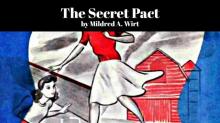 The Secret Pact
The Secret Pact Swamp Island
Swamp Island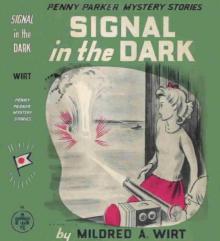 Signal in the Dark
Signal in the Dark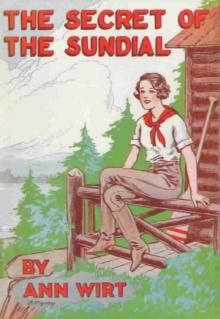 The Secret of the Sundial
The Secret of the Sundial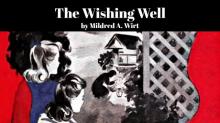 The Wishing Well
The Wishing Well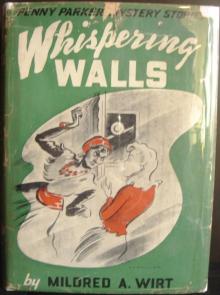 Whispering Walls
Whispering Walls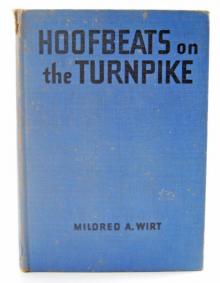 Hoofbeats on the Turnpike
Hoofbeats on the Turnpike The Deserted Yacht
The Deserted Yacht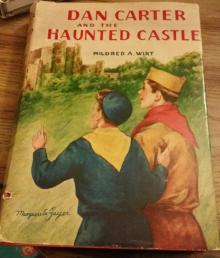 Dan Carter and the Haunted Castle
Dan Carter and the Haunted Castle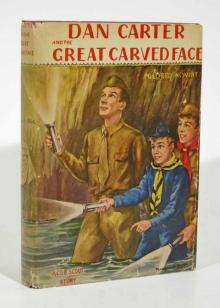 Dan Carter and the Great Carved Face
Dan Carter and the Great Carved Face Saboteurs on the River
Saboteurs on the River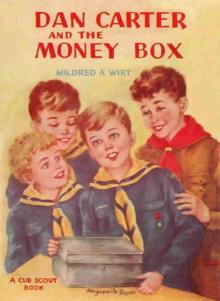 Dan Carter and the Cub Honor
Dan Carter and the Cub Honor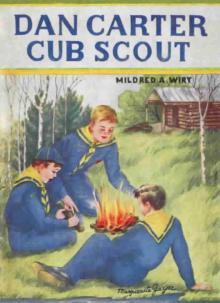 Dan Carter-- Cub Scout
Dan Carter-- Cub Scout Dan Carter, Cub Scout, and the River Camp
Dan Carter, Cub Scout, and the River Camp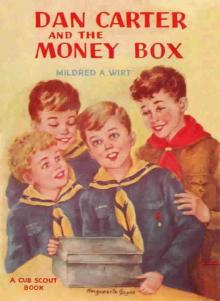 Dan Carter and the Money Box
Dan Carter and the Money Box The Girl Detective Megapack: 25 Classic Mystery Novels for Girls
The Girl Detective Megapack: 25 Classic Mystery Novels for Girls